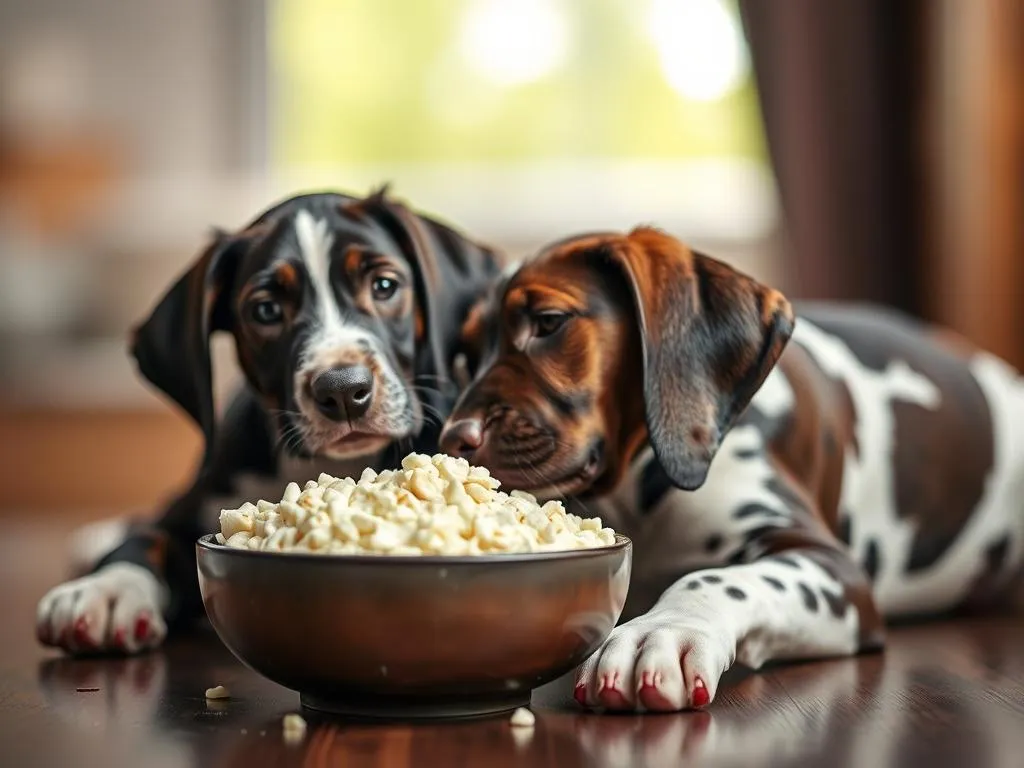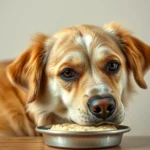
Introduction
Proper nutrition is crucial for all puppies, but it takes on a new level of importance for large breeds like Great Danes. These gentle giants grow rapidly, and their nutritional needs are unique compared to smaller dog breeds. As a new Great Dane puppy owner, understanding the best foods for Great Dane puppies can be overwhelming. This guide will provide you with essential insights into their nutritional needs, the best commercial and homemade diets, feeding guidelines, and common pitfalls to avoid.
Understanding Great Dane Nutritional Needs
Growth and Development Stages
Great Dane puppies experience several critical growth periods in their first year. Their growth can be divided into three main stages:
- Early Stage (0-3 months): This period focuses on rapid growth and development. Puppies require higher protein and fat levels to support muscle and bone development.
- Mid Stage (4-6 months): Growth continues, but it’s essential to begin monitoring their calorie intake to prevent obesity.
- Late Stage (7-12 months): While they will still grow, the rate will slow down. Nutritional focus should shift towards maintaining joint health and overall well-being.
Unique Nutritional Challenges of Great Danes
Great Danes are prone to specific health issues, such as bloat and hip dysplasia. Bloat, or gastric torsion, is a life-threatening condition that can occur in large deep-chested breeds. To mitigate risks, a balanced diet is crucial to avoid rapid growth, which can exacerbate these conditions.
It’s essential to ensure that Great Danes receive the right balance of nutrients to support their unique physiology while avoiding excessive weight gain.
Key Nutrients for Great Dane Puppies
Proteins
Protein is vital for muscle development and overall growth. For Great Dane puppies, the ideal protein content in their food should be around 22-30%.
Best Sources of Protein for Puppies:
- Chicken: A highly digestible protein source.
- Fish: Rich in omega-3 fatty acids, beneficial for skin and coat health.
- Lamb: Another excellent protein source, often hypoallergenic.
Fats
Fats are essential for energy and healthy skin. They should comprise 8-15% of your puppy’s diet.
Recommended Types of Fats and Oils:
- Fish Oil: Provides omega-3 fatty acids that promote a healthy coat and skin.
- Flaxseed Oil: A plant-based source of omega-3s.
Carbohydrates
Carbohydrates are crucial for energy. While puppies need fewer carbs than adults, they should still be included in their diets.
Good Sources of Carbohydrates for Puppies:
- Brown Rice: A highly digestible carbohydrate source.
- Sweet Potatoes: Rich in vitamins and fiber.
- Oats: A great grain option that’s gentle on the stomach.
Vitamins and Minerals
Essential vitamins and minerals play critical roles in a puppy’s growth. Calcium and phosphorus are particularly important for bone development. The ideal calcium-to-phosphorus ratio for Great Dane puppies is approximately 1.5:1.
Essential Vitamins:
- Vitamin A: Supports vision and immune function.
- Vitamin E: Acts as an antioxidant.
Top Commercial Dog Foods for Great Dane Puppies
Grain-Free vs. Grain-Inclusive Diets
When choosing food for your Great Dane puppy, you may come across grain-free and grain-inclusive options. Each type has its pros and cons.
- Grain-Free: Often easier to digest and less likely to cause allergies, but some dogs may require grains for energy.
- Grain-Inclusive: Provides a balanced diet, but low-quality grains can lead to allergies or digestive issues.
Top Brands to Consider
When selecting the best foods for Great Dane puppies, consider brands that prioritize high-quality ingredients. Here are some top-rated options:
- Royal Canin: Known for breed-specific formulas.
- Purina Pro Plan: Offers high protein and balanced nutrients.
- Hill’s Science Diet: Focuses on veterinary-recommended nutrition.
Specific Product Recommendations
- Royal Canin Great Dane Puppy
- Nutritional Profile: 28% protein, 18% fat.
-
Benefits: Tailored for Great Danes, supports joint health, and promotes healthy growth.
-
Purina Pro Plan Large Breed Puppy
- Nutritional Profile: 30% protein, 16% fat.
-
Benefits: Includes DHA for brain development, high-quality protein for muscle growth.
-
Hill’s Science Diet Large Breed Puppy
- Nutritional Profile: 26% protein, 14% fat.
- Benefits: Vet-recommended, balanced nutrition for healthy growth and development.
Homemade Diets for Great Dane Puppies
Benefits and Drawbacks of Homemade Diets
Homemade diets can give you control over your puppy’s nutrition, but they come with challenges. It’s crucial to ensure that meals are balanced and meet all nutritional needs.
Essential Components of a Homemade Diet
When preparing homemade meals, include the following components for a balanced diet:
- Protein: Lean meats (chicken, turkey, beef).
- Carbohydrates: Whole grains (brown rice, quinoa).
- Vegetables: Carrots, peas, and green beans.
- Fats: Fish oil or flaxseed oil for essential fatty acids.
Sample Recipe for Great Dane Puppies
- Ingredients:
- 1 cup of cooked chicken
- 1/2 cup of brown rice
- 1/4 cup of steamed vegetables (carrots, peas)
- 1 tablespoon of fish oil
Consulting a Veterinarian
Before transitioning to a homemade diet, consult with a veterinarian to ensure it meets your Great Dane puppy’s specific nutritional needs.
Feeding Guidelines for Great Dane Puppies
Portion Sizes and Feeding Frequency
Feeding guidelines can vary based on the puppy’s age, weight, and activity level. Generally, puppies should be fed three to four times a day until they are about six months old. After that, you can reduce it to two meals a day.
Monitoring Puppy Growth and Weight
Regularly monitor your puppy’s weight and growth rate. Ideal weight gain for Great Dane puppies is about 2-4 pounds per week. If you notice any deviations from this range, it may be necessary to adjust their feeding schedule or portion sizes.
Common Nutritional Mistakes to Avoid
Overfeeding and Undernourishing
Overfeeding can lead to obesity and joint issues, while undernourishing can stunt growth and development. Signs of overfeeding include lethargy and difficulty moving. Ensure you’re providing the right balance of nutrients without excess calories.
Choosing the Wrong Food
It’s crucial to be able to identify low-quality dog foods. Look for foods with whole meats as the first ingredient, avoid fillers like corn and soy, and steer clear of artificial additives.
Ignoring Individual Needs
Each Great Dane puppy is unique. Tailor their diet to their specific health conditions, activity level, and growth patterns. Regular vet check-ups can help ensure you’re meeting their nutritional needs.
Conclusion
Understanding the best foods for Great Dane puppies is essential for their growth and overall health. A balanced diet, whether commercial or homemade, plays a significant role in their development. Pay close attention to their unique nutritional needs to ensure a healthy and happy life. Consult with a veterinarian regularly to stay informed about the latest dietary recommendations and any necessary adjustments to your puppy’s diet. With the right nutrition, your Great Dane will thrive and become a cherished member of your family.









